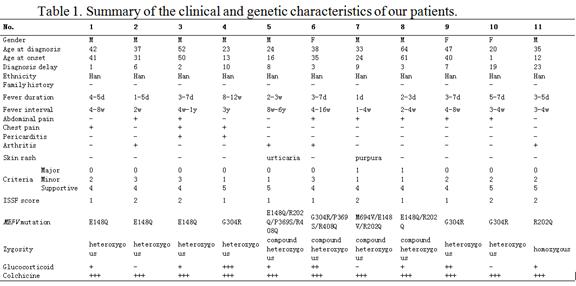Session Information
Session Type: ACR Poster Session C
Session Time: 9:00AM-11:00AM
Background/Purpose :
Familial Mediterranean fever (FMF) is the most common monogenic autoinflammatory disease (AUID) worldwide. There have been hardly any cases reported in Chinese population. We aimed to describe the first cohort of adult FMF patients in Chinese population.
Methods:
We prospectively evaluated clinical and genetic features of adult patients suspected of FMF at the our adult AUID center from April 2015 through April 2017. Patients were diagnosed clinically according to Tel-Hashomer criteria. Whole exome sequencing by Next Generation Sequencing was performed in every patient.
Results:
During the study period, a total of 11 adult patients were diagnosed as FMF. The male to female ration is 8:3. The median age at disease onset was 31 years. All patients were of Chinese Han ethnicity without positive family history. All patients had intermittent self-limiting febrile episodes. Two patients had fever duration of less than 3 days, 7 patients had fever duration of 3 to 7 days. The interval between attacks ranged from weeks to years. During attacks, 7 patients developed generalized abdominal pain; 3 patients experienced chest pain with clear evidence of pleuritis, 2 of wihich also have evidence of pericarditis; 4 patients had arthritis involving large joints; none of the patients reported erysipelas-like skin lesion. Other manifestations included: pharyngitis, headache, aphthous stomatitis, unilateral conjunctivitis, bilateral sacroiliitis, ulcers in the stomach and small intestines. No patient had evidence of amyloidosis. Every patient carried at least one mutation in MEFV gene (1 homozygous, 6 heterozygous, 4 compound heterozygous). Allelic frequencies were E148Q (22.7%), R202Q (22.7%), G304R (18.2%), P369S/R408Q (9.1%), E148V (4.5%), M694V (4.5%).All patients had good response to low to moderate dose of colchicine, whereas the response to low to moderate dose of glucocorticoid varied considerably.
Conclusion:
Our registry suggested for the first time that FMF could be identified among adult Chinese patients suffered from intermittent fever of unknown cause. The incomplete or atypical clinical manifestations of our patients compared to patients with Mediterranean origins may be related to low-penetrance and heterozygous mutations.
References:
1. Giancane G, Ter HNM, Wulffraat N, et al. Evidence-based recommendations for genetic diagnosis of familial Mediterranean fever. Ann Rheum Dis. 2015. 74(4): 635-41.
2. Livneh A, Langevitz P, Zemer D, et al. Criteria for the diagnosis of familial Mediterranean fever. Arthritis Rheum. 1997. 40(10): 1879-85.
To cite this abstract in AMA style:
Wu D, Shen M. Familial Mediterranean Fever in Chinese Adult Patients [abstract]. Arthritis Rheumatol. 2017; 69 (suppl 10). https://acrabstracts.org/abstract/familial-mediterranean-fever-in-chinese-adult-patients/. Accessed .« Back to 2017 ACR/ARHP Annual Meeting
ACR Meeting Abstracts - https://acrabstracts.org/abstract/familial-mediterranean-fever-in-chinese-adult-patients/

